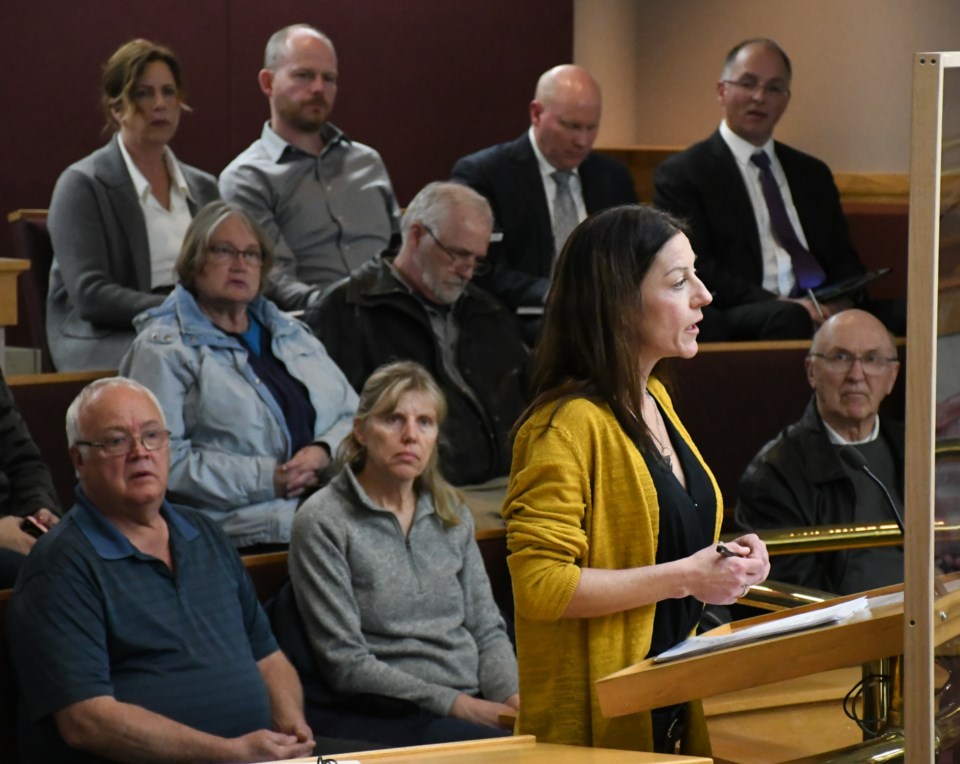It was déjà vu all over again — as Yogi Berra once said — during city council’s recent meeting, as business owners frustrated with their property assessments returned hoping for solutions.
Nearly 40 people from the business community jammed into council chambers on March 27 to hear business owners Bernie Dombowsky and Kristy Van Slyck express further concerns about the Saskatchewan Assessment Management Agency (SAMA).
Dombowsky pushed council to establish a tax policy that was fair and equitable for all business classifications and — similar to his Jan. 9 presentation — showed a video comparing various buildings and shifts in their property assessments.
Van Slyck told council that residents deserved a proper assessment system that was equitable, transparent and understandable. She also criticized SAMA for not pursuing a secondary audit and alleged it refused to conduct a proper quality assurance check on itself.
Nancy Wollner, manager of SAMA’s Moose Jaw office, later spoke about the agency’s recent updates to this year’s commercial valuation model. The Express will feature her presentation in a separate story.
Council voted unanimously to receive and file all three reports.
Criticisms of SAMA
Van Slyck criticized the letter that SAMA sent council on Jan. 11, especially the agency’s statements that it successfully supported its valuation models during appeals in 2021 and 2022 and that it “acknowledged the integrity of the appeal process to ensure transparency and fairness in the assessment system.”
Further, she denounced SAMA’s decision to reject a secondary audit and for making the city manager think there were no other solutions to this problem.
She also slammed the agency’s newest report to council about changes to this year’s assessment process.
SAMA changed the cap rates and how it grouped businesses, reduced by half the value of retailers that are 252 square metres (2,800 square feet), and changed the value of every business category except multi-use buildings, Van Slyck said. It also kicked out one entire business category because one sale out of 56 was deemed illegitimate.
SAMA’s four-year valuation period is based on market sales of Jan. 1, 2019.
“So you cannot analyze new sales because that is outside the time period? If there’s a sale during that period, are you sure that’s the only error you made?” she asked incredulously.
It confused Van Slyck how SAMA “discovered” sales changes this year that it now needs to consider even though there were only 55 total sales — a number that hasn’t changed in four years — to analyze.
“If this was that important to change this much stuff, when, two weeks ago, (SAMA) stated there aren’t any errors (and) we don’t need a secondary audit, so what happened here?” she asked.
“We had an error in the first time period that was discovered during an appeal. That got rid of an entire category. That is significant; one sale!”
Mission failure
Van Slyck highlighted SAMA’s mission statement, which is to develop, regulate and deliver “a stable, cost-effective assessment system that is accurate, up-to-date, universal, equitable and understandable.”
“I personally don’t think they hit any of those,” she said while giving several examples, including how SAMA spent over $700,000 last year — Moose Jaw chipped in roughly $65,000 — on lawyers for appeals.
While everyone is concerned about cap rates rent, other areas like vacancies are also important, she continued. She didn’t think SAMA calculated vacancies accurately because its employees simply drive by properties over two weeks to determine their activity — even though she informs them that some places are vacant.
“This is unacceptable; make them accountable,” she added. “I want you (council) to think about what you’re going to do for the citizens.”
The crowd then broke into applause.
‘Something broken’
Coun. Kim Robinson agreed with Van Slyck that “there’s something broken” with the process. He thought it needed to be fixed soon because some businesses were closing because of the heavy assessment burden.
He suggested that by rejecting the secondary audit request, SAMA was saying it had correctly followed its methodology. However, based on what Van Slyck, Dombowsky and others were saying, if SAMA followed its processes correctly, there wouldn’t be “crazy numbers” with shifts in assessment values.
The next regular council meeting is Monday, April 10.




